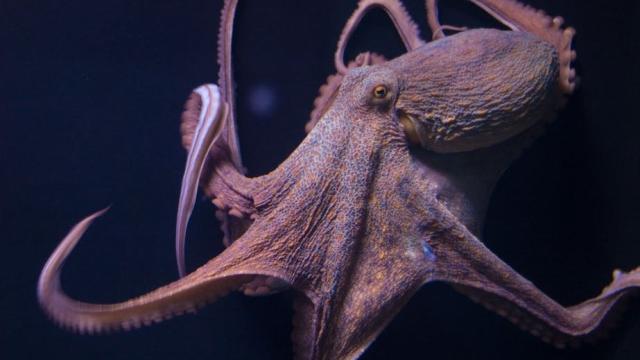For a female octopus, the laying of eggs signifies the beginning of the end.
Like a devoted hen, she’ll guard her brood, stroking the eggs and occasionally blowing water at them, but she won’t abandon them — not even for a second. She’ll grab a welcome snack if the opportunity presents itself, but after four days or so she’ll stop eating altogether. And that’s when things start to get dire.
A week after she’s laid her eggs, the behaviour of a female octopus becomes erratic. Not only is she refusing to forage and eat, she begins to engage in overtly self-destructive behaviours. Female octopuses at this late stage of brooding have been observed to tear off their own skin, eat the tips of their tentacles, and obsessively groom themselves to the point of damage. Horrifyingly, some captive female octopuses have been observed to slam their bodies against the tank.
And then, just when her eggs start to hatch, she dies.
Her orphaned offspring, with no one to guide them, must navigate and survive by themselves — a tribute to octopus intelligence and adaptability. But this behaviour may also explain why these aquatic animals are such solitary creatures — the effects of MDMA notwithstanding.
[referenced url=”https://gizmodo.com.au/2018/09/scientists-gave-mdma-to-octopusesand-what-happened-was-profound/” thumb=”https://i.kinja-img.com/gawker-media/image/upload/t_ku-large/jkzbucsey76lx98fxpve.gif” title=”Scientists Gave MDMA To Octopuses, And What Happened Was Profound” excerpt=”When humans take the drug MDMA, versions of which are known as molly or ecstasy, they commonly feel very happy, extroverted, and particularly interested in physical touch. A group of scientists recently wondered whether this drug might have a similar effect on other species — specifically, octopuses, which are seemingly as different from humans as an animal can be. The results of their experiment, in which seven octopuses took MDMA, were ‘unbelievable’.”]
Octopuses are what scientists call “semelparous” animals, meaning they reproduce just once and then die. It isn’t immediately obvious why this should be a part of the octopus life cycle, but there are some theories.
Octopuses frequently engage in cannibalistic behaviour, so this biologically programmed death may be nature’s way of preventing mothers from eating their young. Or, because octopuses are capable of growing to enormous sizes, this might be a built-in way to protect the ecosystem from too many large, hungry adults. But the reality is that scientists still aren’t sure.
As for the physiological processes responsible for this behaviour, that’s also a bit of a mystery. But in 1977, scientists discovered that these behaviours disappeared when the optic glands — the octopus equivalent of the mammalian pituitary gland — were removed from brooding females. With the optic gland gone, females abandoned their eggs, began eating again and even mated.
Scientists figured they had pinpointed a single “self-destruct” hormone, but new research by Z. Yan Wang, a grad student at the University of Chicago, shows it’s more complicated than that.
Using gene sequencing tools, Wang and her colleagues identified several distinct molecular signals produced by the optic gland after captive female octopuses reproduce. These signals were then linked to the distinctive maternal behaviours observed in brooding octopuses, specifically captive California two-spot octopuses kept at Wang’s lab.
The researchers removed the optic glands at multiple phases of the brooding cycle, allowing them to sequence the RNA transcriptome — the instructions for building proteins — at each stage.
“It’s really exciting because it’s the first time we can pinpoint any molecular mechanism to such dramatic behaviours, which to me is the entire purpose of studying neuroscience,” said Wang in a statement.
Here’s what the researchers found, as described in a release from the University of Chicago:
During the non-mated phase when females were actively hunting and eating, they produced high levels of neuropeptides, or small protein molecules used by neurons to communicate with each other that have been linked to feeding behaviour in many animals. After mating, these neuropeptides dropped off precipitously.
As the animals began to fast and decline, there was more activity in genes that produce neurotransmitters called catecholamines, steroids that metabolize cholesterol, and insulin-like factors. Wang said finding activity related to metabolism was surprising because it’s the first time the optic gland has been linked to something other than reproduction.
As to how these signalling changes are producing such specific behaviours in the brooding octopus, that isn’t entirely clear. But this new study, published in the Journal of Experimental Biology, is presenting a new pathway for scientists to move forward.
“Before when we only knew about the optic gland, it felt like watching the trailer to a movie,” said Wang. “You get the gist of what’s going on, but now we’re beginning to learn about the main characters, what their roles are, and a little bit more about the backstory.”
As a final note, male octopuses don’t have it much better, either. As Wang points out, females typically kill and eat their mates, and if not, they die a few months after mating anyway. For octopuses, sexual maturity kinda sucks.
